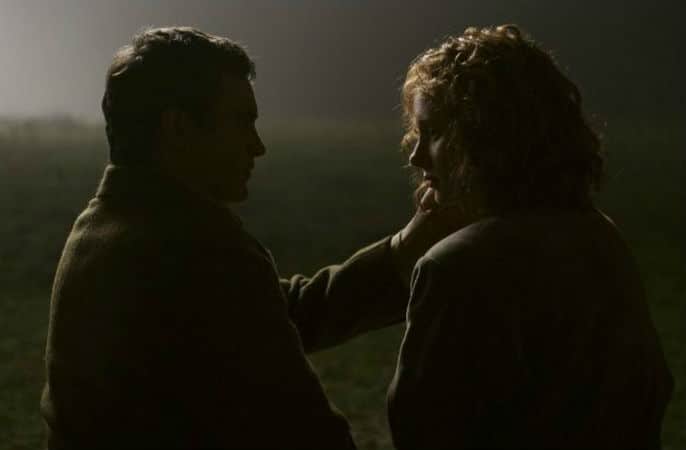
Photo: Touchstone Pictures
Maybe it seems strange to discuss a movie years after its release (2004), but since M Night Shyamalan is frequently ridiculed in film discussions, I thought I’d take the time to defend him, at least in relation to The Village.
As a little reminder, according to the product description the film is about:
“An isolated, tight-knit community lives in mortal fear of an oppressive evil inhabiting the forbidden forest just beyond their tiny village. So frightening that no one ventures into the woods … until one villager dares to face the unknown. “
MARKETING
To discuss and defend this film I first want to go back to before the movie even premiered. Part of the issue with this film was marketing. Many people hated the film because of expectations. Take a look at some of the early trailers. It was previewed as a scary film about monsters, but what everyone got instead was a metaphorical artsy, even romantic film. Most people don’t like to get an apple when they’ve been expecting an orange. Somehow it just doesn’t taste as good.
THE TWIST ENDING
Beyond the marketing, I also don’t think people liked this film because they said they figured out the ending. I can figure out the ending to almost every movie I watch, but that typically doesn’t ruin it for me if the story is executed well. That said, I don’t think AS many people figured the whole thing out as claimed. It was popular to say you did, though. I’m sure some people did, but not everyone. I even had one person tell me they figured it out by the good teeth and the “design” of the modern fences. I was like, “really?”
Besides, even if you did figure out the ending I don’t think this movie is just about having twists. So just because you figure out the end of the movie doesn’t make it bad.
NATHANIEL HAWTHORNE
In college, I had the opportunity to read up on a lot of Nathaniel Hawthorne stories. Most people are familiar with The Scarlett Letter, but he also wrote stories such as “Rappaccini’s Daughter,” “The Birthmark,” and “Young Goodman Brown.” If you haven’t read them I recommend reading up on them, you might see some of the parallels between The Village and Hawthorne’s stories. They have similar themes, metaphors, symbolism and especially use of color. What I find most interesting about Hawthorne is his use of color, particularly yellow, red, and pink. Red in his stories symbolizes sin, sorrow, love, etc… (IE: The Scarlett Letter) Yellow symbolizes innocence as does pink. His stories also have the prevalent theme of innocence and the loss of it due to sin.
The reason why I think the film succeeds (if taken in context and looked at objectively) is because I argue M Night created a modern day Hawthorne story.
Going back to The Village, The reason why I think the film succeeds (if taken in context and looked at objectively) is because I argue M Night created a modern day Hawthorne story.
So let’s take a closer look:
COLORS

Photo: Touchstone Pictures
This movie deals with colors a lot, but especially yellow and red. Yellow in the film symbolizes innocence. If you notice, none of the elders ever wear the safe color. Only the younger ones do. They are never seen wearing yellow because they are not innocent. The elders try to avoid sin and sorrow, but by doing so become sinful themselves. There are key moments when certain characters lose their innocence, and to represent this they are covered in red.
- Noah loses his innocence by stabbing Lucius. He’s covered in his blood to show his loss of innocence.
- Ivy loses her innocence when she finds Lucius covered in blood. To reveal her loss of innocence by experiencing sorrow for the first time she stands in the field covered in his blood. It’s also important to note that she has red hair.
Noah is a symbol himself. Because he is mentally ill or cognitively challenged, whichever the case may be he represents the purest kind of innocence. He’s portrayed in the beginning of the film as a child. He laughs, hits the other kids, is put in time out; takes the bad color without thinking, as if he doesn’t quite know right from wrong. Everything that happens to Noah in the film could arguably be the elder’s fault. They never leave to get him help, which could have in fact stopped him from becoming insane.
Isn’t it ironic that the most innocent character turns out in fact to be the killer?
Isn’t it ironic that the most innocent character turns out in fact to be the killer? M Night was definitely trying to say something here.
THE ROCKING CHAIRS
Arguably the rocking chairs are the hardest symbol to figure out. But clearly, they are important, as Shyamalan takes quite a bit of screen time focusing on them.
Personally, I think the chairs also represent a loss of innocence; this time through sorrow. If you watch the film, you notice that they are usually empty. No one sits in them. But Ivy’s father tells her that he sat in that rocking chair when he first found out that she was blind. This scene implied that he lost his innocence because he didn’t take his daughter to go back to town to receive medical attention, and therefore she became blind (symbolic of him keeping her in the dark).
At one point Ivy almost sits in a rocking chair, but then doesn’t. Later both she and Noah sit in rocking chairs because they have lost their innocence. They have felt true sorrow and grief.
Also, note the scene when the dance room from the wedding party is empty and all the chairs are empty. I think this was saying the elders were, in fact, innocent from these particular animal killings. The whole town was innocent.
Going back to grief, the rocking chairs certainly represent sadness and mourning. Because the town hides from sorrow, they never mourn. Nor do most of them have reason to mourn. They sit in the chairs when they have reason to mourn; hence why the character August Nicholson sits in the chair when he mourns the loss of his son.
IVY’S BLINDNESS
Ivy symbolizes the fact that the elders keep the villagers in the dark about the real world. It should be pointed out though that Ivy can, in fact, see a few colors. She sees a color when she sees Lucius and she sees a color when she sees her father; two different colors. Yet she never specifies what they are. Mr. Walker says to Ivy that she “sees light when there is only darkness.” I think she sees the color yellow when she sees Lucius and the color red when she sees her father. But she never says because she doesn’t want them to know. I think she sees yellow in Lucius because he is innocent, and she sees red in her father because he is not.
THE MONSTERS
In my opinion, the best horror films reveal that the real monster is, in fact, you. Hence why in Signs Mel Gibson can’t overcome the aliens until he first overcomes his inability to forgive, and why there are so many mirrors in it to reveal who the real monster is. The monsters are called “those we don’t speak of,” representing the secrets we ourselves don’t speak of. The monsters represent the worst parts of ourselves we don’t want others to see. The elders have in fact become monsters by trying to hide from sin, sorrow and the monstrosities of human nature. The black boxes they each keep in their house represent their inner demons as well as their inner secrets.
SUMMING UP
While there are many more symbols and metaphors I could go into, the ones I’ve discussed are the main ones.
Beyond the beautiful use of colors and symbolism, the film is well written, suspenseful, beautifully shot and acted. Not to mention the incredible music score (one of the best out there). I think that The Village is an intelligent film with artistic merit and with many great pieces of literature as its influences. The love stories in it are powerful because of the subtlety and the symbols and visual imagery is incredible.
I also want to point out again that just because you figure out the ending of a story, it doesn’t make it less great. This is not a story about twists or being scared, it’s a story about real people and how their inner demons affect them and the people around them. You can’t hide from sin and sorrow; it’s a part of life and has a way of finding you no matter how hard you run from it.
If you haven’t seen The Village or maybe didn’t like it the first time around, I suggest giving it a second look. I think it’s much better than people typically give it credit for.
Have you seen The Village? What did you think of it? Do you agree or disagree with my assessment and comparison? Sound off below…
RELATED:
Read about The New Age of Book Banning.
Look at my film review of Stories We Tell.
ARE YOU A ROMANCE FAN? FOLLOW THE SILVER PETTICOAT REVIEW:
 Our romance-themed entertainment site is on a mission to help you find the best period dramas, romance movies, TV shows, and books. Other topics include Jane Austen, Classic Hollywood, TV Couples, Fairy Tales, Romantic Living, Romanticism, and more. We’re damsels not in distress fighting for the all-new optimistic Romantic Revolution. Join us and subscribe. For more information, see our About, Old-Fashioned Romance 101, Modern Romanticism 101, and Romantic Living 101.
Our romance-themed entertainment site is on a mission to help you find the best period dramas, romance movies, TV shows, and books. Other topics include Jane Austen, Classic Hollywood, TV Couples, Fairy Tales, Romantic Living, Romanticism, and more. We’re damsels not in distress fighting for the all-new optimistic Romantic Revolution. Join us and subscribe. For more information, see our About, Old-Fashioned Romance 101, Modern Romanticism 101, and Romantic Living 101.

This was so insightful and I agree with your assessment! I liked this movie and I’m so glad you mentioned the rocking chairs, as I have never been able to pinpoint their meaning. The porch scene with Ivy and Lucius is one of my favorites. Thanks for the great post!
Thank you! The rocking chairs were definitely a challenge to figure out! This is my best guess about them. Anyway, thanks and you’re welcome. 🙂
Loved this analysis! I have to admit that as a kid, I felt disappointed after watching the felt as I too had expected it to be a gruesome horror film. After having watched it a decade later I realized that this was in fact a beautiful film with loads of symbolism and metaphors. I guess it was the Film Studies class in high school that made me change my perception on films, I dunno. Anyways, thanks for this assessment!
Thank you! Over time our perceptions of a film can definitely change. 🙂 Anyway, you’re welcome! Thanks for your thoughts.
I absolutely love this film and it has become one of my favorites of M. Night’s over the years. I found myself on this page because my wife and I were watching The Village last night and noticed the rocking chairs. We were trying to figure out the meaning while watching the movie and basically came to the same conclusion you did. We think that the rocking chairs represented loss and/or sorrow. Everyone of the elders had lost something. I like how you also mentioned loss of innocence and I definitely agree with this.
I think this is a great movie and it’s frustrating to see how so many people criticize it and completely write it off. I agree with you about the film’s score. It is definitely one of the best movie scores ever written and it adds such an emotional depth to the movie.
Thanks for defending this wonderful movie and to those reading, if you haven’t seen this movie, check it out for sure. If you watched it years ago and hated it, watch it again from a different perspective. It is not a monster/horror movie. It is something much more than that, with a lot more meaning. And that is what most people miss.
Thank you for your response! I appreciate your thoughts on the film. I agree, it is frustrating to hear people just toss away this film without really giving it a fair, objective chance. It’s too bad since they’re really missing out on something great. Anyway, you’re welcome. And yes, people really should give it another chance and watch it from a new perspective.
I watched it again tonight for probably the fourth time. My favorite MNS movie, without a doubt. It’s refreshing to read that I’m not the only one scratching my head wondering why others can’t see how good it is. As a side note, I don’t even remember it being in theaters or seeing any trailers. I knew absolutely nothing about the film when I rented it on DVD many years ago. I wonder how different my feelings about the film would have been had a gone into it with the preconceived misconceptions that others did. Thanks for writing this.
Thanks for your thoughts! Yes, perhaps not knowing anything about the film helped since you didn’t have any prejudice or preconceived notions going in. You’re welcome. 🙂 I really enjoy this film too.
This movie I watched it when I was 14 years old. It’s one of the best movies I’ve watched and the only one my mom watched wthout getting asleep. That’s a huge thing.
I like the subtleness, Lucius and Ivy’s love, the causes of their aislation, the music, everything.
I agree. I love the subtlety of the film. In some ways it is really an artsy romance!
Me and my fiance watched the Village last night because we both loved it the first time, and we loved it the second time up til the end. It just doesn’t make sense to not get the medicine when you own the area, and the guy in charge is in the know. Heck he could even drop regular supplies off, or dress up himself to deliver it. The movie is still interesting, but him owning it made the whole pretext of the elders oath kinda ridiculous.
Tabitha Walker’s general absence makes no sense for multiple reasons. Due to the importance of her daughter and making it more clear her Father was married. Add in the idea that the Villiage is not sustainable when you realize it was only a handful of families that started it. Inbreeding is going to be a huge issue after a few more generations.
I loved the romance and characterizations, but the second watch had the plot holes be a little too jarring.
Loved this movie from the first time I saw it despite expecting a monster movie. Terrific analysis. In some ways we should have expected the creatures not to be real after three movies in a row where the fantastical elements (ghosts, superhero, aliens) turned out to be true. Shyamalan likely wanted to subvert expectation at this point.
Hello from France I remember I watched that movie In a beautiful movie theater in Paris.Everything was perfect. I was 18 years old maybe, and I loved it. I don’t understand the bad comments, because there is everything in that movie. Romance, scary moments, wonderful music, wonderful Colors, surprises, good actors, poetry… the kind of movie you don’t forget. And your analysed of it is very nice